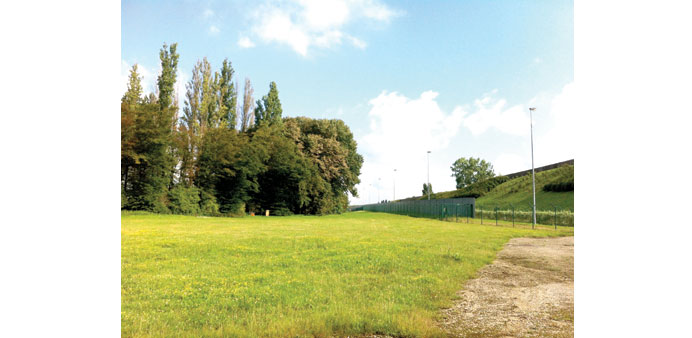By Alexandra Mayer-Hohdahl
Nestled in between roaring aeroplanes and cars swooshing by, the newest tenants at Brussels Airport are starting to settle in.
They are rather low maintenance: thousands of them live in two wooden boxes in a small grove, feeding on nearby flowers and producing golden-coloured honey.
Bees, it turns out, are quite happy living at airports.
Loud aeroplane engines and fuel vapours do not seem particularly to bother them, and the lack of pesticides on airfields is a luxury rarely found in the countryside anymore.
“If the noise and the fuel disturbed the bees, the colonies would not be in good shape,” beekeeper Vincent Dugarry said, as he opened up the hives on a recent summer day.
“But what I am observing here is that they are in great form and in very, very good health,” he added, noting the bees’ healthy honey production and lack of aggressiveness.
The airport beehives are the first of their kind in Belgium. Airfields in other parts of Europe and the United States already have similar set-ups.
The two hives were installed in May by Apiterra, a firm that specialises in placing colonies at companies and on other private properties, as part of a bid to boost Europe’s bee population.
Bees play an important role in the pollination of crops, and a decrease in their numbers has in recent years raised economic and food supply concerns.
A study carried out during the winter of 2012-13 in 17 of the European Union’s member states found the highest bee mortality rates that winter in Belgium, at 33.6 per cent.
Airport spokeswoman Florence Muls said the idea of installing beehives took off quickly at Belgium’s main airport, even though it does involve a cost — about 2,000 euros (2,679 dollars) per beehive per year for the upkeep of the bees, according to Dugarry.
But in return, the bees are expected to produce 15 to 60 kilograms of honey annually. If its quality tests well, a decision will have to be made on how to dispose of the relatively small quantity of honey.
Muls said it could for instance be distributed to airport staff.
If the overall experiment proves successful, more hives could follow, she said.
The airport is keen to polish up its environmental image.
The beehives are the latest in a series of efforts undertaken to make the facility more environmentally friendly, including recycling bins, solar panels and a water treatment plant that collects airport water and provides it purified to a nearby golf club.
But the aeroplane noise is what has been making headlines in Brussels, following a political decision to redirect more flights over the capital.
The airport, located less than 15 kilometres from the city centre, clocks some 600 to 700 take-offs and landings a day, Muls said.
“We will never prevent planes from making noise and producing emissions. ... We are perceived as a disturbance,” she acknowledged.
“But we also have assets,” she added, gesturing to the extensive airport property that is only partially covered by tarmac and buildings.
“Bees are not deaf, but it’s not their strongest sense,” Dugarry noted. “What is most important is that there is water and healthy food for the bees.”
The hives, containing some 50,000 bees each, have been set up in a grove of trees at one of the property’s extremities, in between an airport runway and a local road.
Some of the airport staff could eventually take over their care, Muls said. Currently, Dugarry stops by every two weeks to check on the hives and provide veterinary care if needed.
“The pressures that the bee faces nowadays from predators and the environment are extremely strong,” he noted. “But these little darlings are doing very, very well. — DPA

